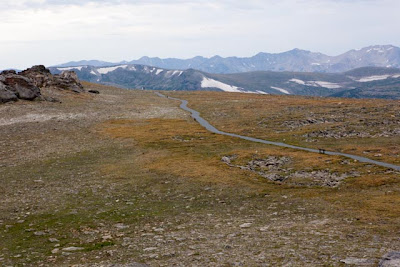
This morning I woke up with mountains on my mind. I can't seem to get the images out of my head. In my mind's eye I see rows of lofty, bald peaks flanked by blankets of dark green forests. I view them from afar, across deep valleys, hazy and brooding against the horizon. Near the tops, above the treeline, I see patches of late summer snow lingering under shadowed cliffs.
The other images I see are the dark piles of stone at the top of the peaks. They are sculpted by the weather and ice into strange forms standing along the crest of the mountaintop. They seem to be waiting through the gloom of the overcast day for a full moon on a clear night, or for a magical alpenglow, so that robed figures can appear and dance along their bases.
The mountains in my mind are images of real mountains I saw on a recent drive through Rocky Mountain National Park in Colorado. The road through the park winds over a high pass, rising above the treeline to 12,000 feet. Near the top of the pass, I found a pullout and stopped to take in the view. I noticed a paved foot trail winding up the hill to what appeared to be the broadly crested peak. The wind was cold and most people were staying close to their cars. I decided to walk up the trail. I put on a jacket and started hiking. After an initial ascent of several hundred yards, the trail broke onto a broad, rounded summit. The ground was a tundra environment, adapted to the perennial cold. Wildflowers and ground-hugging plants were the only vegetation. Briefcase sized rocks were standing on edge, propped up in their postions by the almost constant freezing and thawing of the underlying groundwater. I saw a pika gather stems in it's mouth and then scurry into a hole in the rocks. I heard a high pitched bark, and then noticed a marmot nosing through the wild flowers a few yards away.
In the distance, on the very highest ground, I noticed a pile of rocks. At first I thought it was man made, possibly a rock shelter built by the Park Service. As I walked closer, I saw that the formation was natural, although the man-made trail wound along the base. I noticed other rock formations eroded in bizarre shapes. In the rocks I saw stacks of color, or more like stacks of contrast in the colorless light of the overcast day. I saw mushroom caps of black rock sitting on rocky white stems. Further up the trail was a house-like form of jumbled black and white stone. I saw the black was layered and swirled with dark gray and pink textures, and the white was speckled with colors of light pink and orange, and was flecked with glistening, metallic-looking mica.
I felt an intimacy with those mountains as I walked along the trail. I felt that they were sharing their secrets with me. Far off I could see other peaks. Some were lower and some were a bit higher, but they were just like the peak that I am standing on, created by the same geological processes. My breath was slightly labored in the thin air of 12,000 feet. I saw, but I could also feel, the history of those mountaintop rocks. I saw the layered look of the dark rocks, and I sensed their creation as layers of mud at the bottom of an ancient sea. I felt the chaotic energy of the magmas welling up from deep below and forcing its way between the layers and into the cracks of the deeply buried and compacted sediments. I sensed almost intuitively the tortuous heat and pressure that those rocks had endured. The rocks had become so hot that the original shale had metamorphosed and recrystallized into different constituent minerals. The original flat lying layers were now bent and contorted with a marble cake appearance. Most amazingly to me, was that all those rocks were formed in the sea, and were buried and altered deep within the earth, but now they were sitting literally miles above sea level on top of those mountain peaks. I thought of the incredible forces, generated by the moving continents, that pushed up the mountains and lifted those rocks high above the originating seabed. It's almost beyond a person's imagination, yet by sensing those processes, I felt that the spirit of the mountain was somehow blended together with my own.
From the point where I walked back down the trail to my car, those mountains and those rocks have been on my mind. They seem to be calling to me and I am drawn to them. Their imposing nature gives a sense of immovable permanance, but by making the effort to go to them and to learn their secrets, I was helped to understand the long process of change that created them. This knowledge gives me a feeling of spiritualness. Why? Maybe it is because I know that I came from the earth, and at some point I will go back to the earth to rejoin the processes that built those mountains. My life is a brief expression of consciousness so that I can contemplate the mountain, and perhaps the mountain can contemplate me.